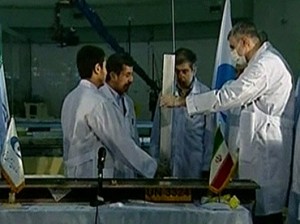 WASHINGTON ó By subtly putting its hands on the brakes of its uranium enrichment efforts,†Iran†may be signaling that it wants to avoid a direct confrontation over its†nuclear program, at least in the near term, according to United States and other Western officials. †The action has also led some analysts to conclude that Iranís leaders are showing signs that they†may be more interested in a deal to end the nuclear standoff with the West.
WASHINGTON ó By subtly putting its hands on the brakes of its uranium enrichment efforts,†Iran†may be signaling that it wants to avoid a direct confrontation over its†nuclear program, at least in the near term, according to United States and other Western officials. †The action has also led some analysts to conclude that Iranís leaders are showing signs that they†may be more interested in a deal to end the nuclear standoff with the West.Evidence began emerging last summer that the Iranians were diverting a significant portion of their medium-enriched uranium for use in a small research reactor, converting it into a form that cannot easily be used in a weapon.
One American official said the move amounted to trying to ďput more time on the clock to solve this,Ē characterizing it as a step ďyou have to assume was highly calculated, because everything the Iranians do in a negotiation is highly calculated.Ē Israelís departing defense minister, Ehud Barak, came to a similar conclusion when he said in October that his country could safely back away from threats of military action against Iran, at least until the late spring or summer of 2013.
But White House, State Department and Pentagon officials all cautioned against drawing firm conclusions about Iranís ultimate intentions.
A new session of talks involving Iran and six major powers, including the United States, is expected next year, and American officials say they still cannot determine whether Iranís supreme leader, Ayatollah Ali Khamenei, is ready to strike a deal.
A quiet feeler seeking direct talks with Iran that the administration put out after President Obamaís re-election last month resulted in ďno real response,Ē another senior official said, adding: ďIt wasnít that they said yes or no. They said nothing.Ē
These uncertainties underlie the hunger in Western countries to understand why Iran appears to be keeping its stockpile of medium-enriched uranium ó which could be converted to bomb fuel in weeks or months ó to a level below the amount necessary to build a single weapon.
Evidence from a variety of sources, including the†International Atomic Energy Agency, suggests that as Iran produced more uranium enriched to near 20 percent purity, a process that takes it most of the way to bomb-grade fuel, it began diverting some into an oxide powder that could be used in a small research reactor in Tehran. That diversion is believed to have begun in August.
Iran had been complaining for years that the research reactor, which was supplied by the United States during the rule of Shah Mohammed Reza Pahlavi to produce isotopes for medical purposes, was running out of fuel, and that the West refused to sell it more. So it decided to make the fuel itself. Now, even though it has enough fuel to keep the reactor running for at least a decade, it may be making more, several sources indicate.
The statistics released in quarterly reports by the atomic energy agency show that if Iran had not diverted fuel to that project, it would have enough medium-enriched fuel for one bomb and would be on its way to enough for a second. Instead, as of the agencyís last report, in November, Iran had enriched 232 kilograms (about 511 pounds) of the fuel, nearly enough to produce a weapon. But more than 96 kilograms (almost 212 pounds) had been sent off for fabrication into fuel plates for the reactor. Once turned to that purpose, the fuel is very difficult to use in a bomb.
The diversion ďwas a move to take heat away so that things didnít go over the tipping point,Ē said Olli Heinonen, the former head of inspections for the atomic energy agency, who dealt with Iran extensively. Mr. Heinonen, now a senior fellow at the Kennedy School of Government at Harvard, said that since the diversion, the Iranians had continued to produce about 15 kilograms (about 33 pounds) a month of medium-enriched fuel. So unless they slow that pace, or divert more fuel to the reactor program, ďthey are going back up to the tipping point,Ē he said.
Iran could use that to its advantage in negotiations. ďI think it is hard to understand what Iran was doing if not sending a deliberate signal, signaling some cautiousness,Ē said Greg Thielmann, a former State Department intelligence analyst who is now at the Arms Control Association. ďI think it is reasonable to see the diversion as a negotiating signal, and a note of moderation.Ē
Ray Takeyh, an Iran specialist at the Council on Foreign Relations, said that ďthe sanctions policy that the United States has pursued over the past decade is beginning to bear fruit.Ē He said that the steps, which have led to a huge devaluation of the Iranian currency and a sharp decline in Iranian oil exports, ďhave seemingly succeeded in convincing influential sectors of the theocracy to reconsider their options.Ē
Some Arab officials agree, though they warn that it could be three years before the sanctions hurt Iran enough to bring about a change of position. ďThe problem is we donít have three years,Ē a senior Arab diplomat said recently.
The big question is whether any of this is more than tactical positioning. ďTehran almost certainly hopes the diversion will be read in Western capitals as a sign of its willingness to reach a deal,Ē said Paul R. Pillar, a former C.I.A. analyst who is now at Georgetown University.
By The New York Times
The Iran Project is not responsible for the content of quoted articles.










